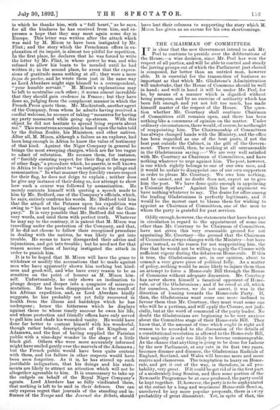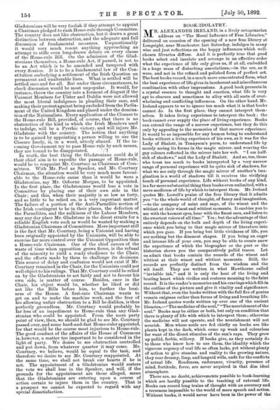THE CHAIRMAN OF COMMITTEES.
IT is clear that the new Government intend to ask Mr. Peel to continue to preside over the deliberations of the House,—a wise decision, since Mr. Peel has won the respect of all parties, and will be able to control and steady the jarring groups out of which the Parliament just elected is composed, far better than an untried man, however able. It is essential for the transaction of business so important as that which Mr. Gla.dstone's Administration will undertake, that the House of Commons should be well in hand ; and well in hand it will be under Mr. Peel, for he, by means of a manner which is dignified without being pompous, and by an exercise of authority which has been felt enough and yet not felt too much, has made himself master of the respect of the House. The ques- tion whether Mr. Courtney shall continue Chairman of Committees still remains open, and there has been nothing like a consensus of opinion on the matter. Ender ordinary circumstances, there would, of course, be nothought of reappointing him. The Chairmanship of Committees has always changed hands with the Ministry, and the office has been regarded as one of the best posts, if not the best post outside the Cabinet, in the gift of the Govern- ment. There would, then, be nothing at all unreasonable in the Gladstonians saying :—‘ We are very well satisfied with Mr. Courtney as Chairman of Committees, and have nothing whatever to urge against him. The post, however, is one which rightly belongs to one of our own men, and it would be unfair to disappoint one of our own supporters in order to please Mr. Courtney. We owe him nothing, and he cannot, and no doubt does not, expect us to give him the post. We have done quite enough in appointing a Unionist Speaker.' Against this line of argument we have nothing whatever to say. The desire for office among the leading Gladstonians is perfectly legitimate, and it would be the merest cant to blame them for wishing to appoint as Chairman of Committees, one of the men to whom the party is grateful for past services.
Oddly enough, however, the statements that have been put in circulation in regard to the appointment of some one other than Mr. Courtney to be Chairman of Committees, have not given this very reasonable ground for not appointing Mr. Courtney—the ground that the Chairman of Committees always changes with the Ministry—but have given instead, as the reason for not reappointing him, the fear that he would not be willing to apply the Closure with sufficient vigour during the debates on Home-rule. If this' is true, the Gladstonians are, in our opinion, about to commit a very grave piece of political folly. As a matter of policy, nothing would be more likely to injure them than an attempt to force a Home-rule Bill through the House of Commons without adequate discussion. Mr. Courtney has never shown himself a fanatical opponent of Home- rule, or of the Gladstonians; and if he erred at all, which for ourselves, however, we do not assert, it was in the direction of leaning towards the Home-rule Party. If, then, the Gladstonians want some one more inclined to favour them than Mr. Courtney, they must want some one who will be a partisan, and. will apply the Closure, not judi- cially, but at the word of command of the party leader. No doubt the Gladstonians are beginning to be very anxious about the Committee stage of their Home-rule Bill. They know that, if the amount of time which ought in right and reason to be accorded to the discussion of the details of a constitutional revolution is allowed to the Home-rule Bill, their majority is only too likely to become unmanageable. As the chance that anything is going to be done for Labour by the new Parliament, at any rate in its first two years, becomes dimmer and dimmer, the Gladstonian Radicals of England, Scotland, and Wales will become more and more restive and clamorous. The temptation to hurry on Home- rule, and get it out of the way, is therefore, in all pro- bability. very great. If it could be got rid of in the first part of a moderately long Session, and then some portion of the Newcastle Programme be at once produced, the party could be kept together. If, however, the party is to be asphyxiated at the outset by a long and wearisome Home-rule Sesthn, unrelieved by any more popular proposals, there is cvary probability of great discontent. Yet, in spite of that, the Gladstonians will be very foolish if they attempt to appoint a Chairman pledged to rush Home-rule through Committee. The country does not like obstruction, but it draws a great distinction between obstruction, and the adequate and full discussion of fundamental measures. Unquestionably it would very much resent anything approaching an attempt to stifle even long-drawn debate on every clause of the Home-rule Bill. On the admission of the Glad- stonians themselves, a Home-rule Act, if passed, is not to be an Act which is to be amended and tampered with every Session. It is to be a fundamental law of the Con- stitution embodying a settlement of the Irish Question on permanent and unalterable lines. What is settled will be settled once and for all. But under these circumstances, to check discussion would be most unpopular. It would, for instance, throw the country into a ferment of disgust if the Unionist Members for Ulster and Dublin were not allowed the most liberal indulgence in pleading their case, and making their protest against being excluded from the Parlia- ment of the United Kingdom and placed under the domina- tion of the Nationalists. Every application of the Closure to the Home-rule Bill, provided, of course, that there is no obstruction of the kind in which the Irish Members used to indulge, will be a Pyrrhic victory, and will injure Mr. Gladstone with the country. The notion that anything is to be gained by appointing a person willing to use the Closure freely, is, in a word, utterly absurd. If the in- coming Government try to pass Home .rule by such means, they are bound to be disappointed. In truth, the best thing the Gladstonians could do if their chief aim is to expedite the passage of Home-rule, would be to reappoint Mr. Courtney as Chairman of Com- mittees. With Mr. Peel as Speaker, and Mr. Courtney Chairman, the situation would be very much more favour- able to the Home-rule cause than it would be were a Gladatonian, say Mr. Osborne Morgan, to be appointed. In the first place, the Gladstonians would lose a vote in Committee by placing one of their own side in the Chair ; and this, when their majority is so low as forty, and so little to be relied on, is a very important matter. The failure of a portion of the Anti-Pamellite section of the Irish contingent to be in their places, the defection of the Parnellites, and the sulkiness of the Labour Members, may any day place Mr. Gladstone in the direst straits for a reliable English vote such as would be wasted by making a Gladstonian Chairman of Committees. More important still is the fact that Mr. Courtney, being a Unionist and having been originally appointed by the Unionists, will be able to exercise far more control over the Unionist Opposition than a Home-rule Chairman. One of the chief causes of the waste of time when opposition grows fierce, is the refusal of the minority to yield a ready obedience to the Chair, and the efforts made by them to challenge its decisions. This source of delay and confusion would not exist if Mr. Courtney remained in the Chair, for the Unionists could not well object to his rulings. That Mr. Courtney could be relied on by the Gladstonians to act fairly and not to favour his own side, is matter of course. Besides, once in the Chair, his object would be, whether he liked or did not like the Bills before him, to further the busi- ness of the House. A first-rate Chairman wants to get on and to make the machine work, and the fear of his allowing unfair obstruction to a Bill he dislikes, is thus perfectly groundless. Mr. Courtney would probably be far less of an impediment to Home-rule than any Glad- stonian who could be appointed. From the mere party point of view, then, we should be glad to see Mr. Courtney passed over, and some hard-and-fast Home-ruler appointed, for that would be the course most injurious to Home-rule. The good conduct of the affairs of the House of Commons is, however, a matter too important to be considered in the light of party. We desire to see obstruction controlled and put down, from whatever quarter it may come. Mr. Courtney, we believe, would be equal to the task, and therefore we desire to see Mr. Courtney reappointed. At the same time, we shall not break our hearts if he is not. The appointment of a Gladstonian would restore the vote we shall lose in the Speaker, and will, if the grounds for the appointment are those alleged, mean that the Gladstonians are entering upon a course of action certain to injure them in the country. That is a prospect we cannot be expected to regard with any special dissatisfaction.



































 Previous page
Previous page